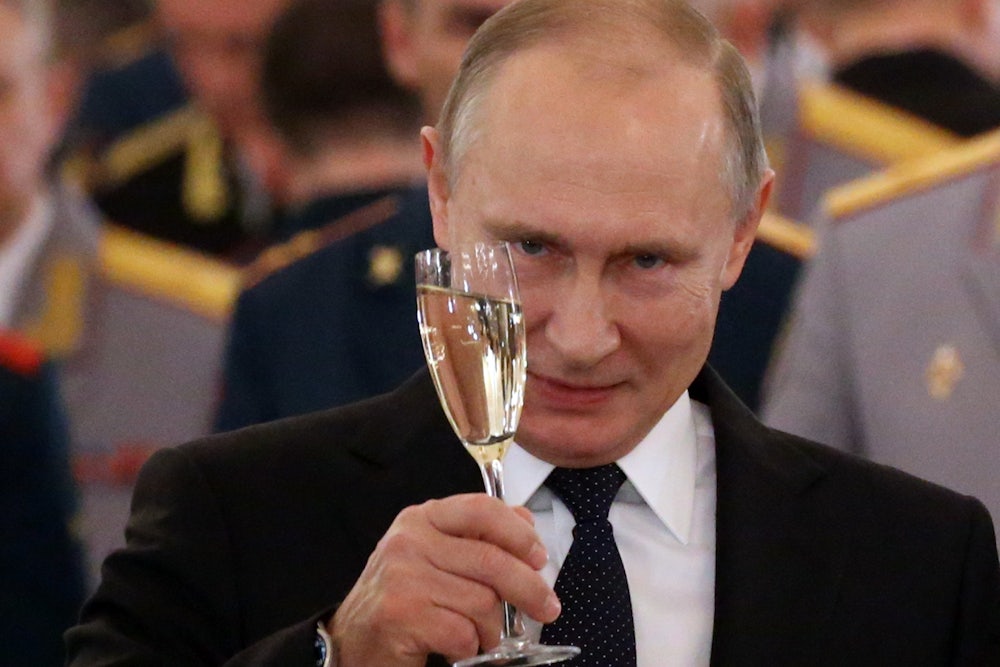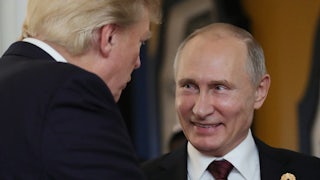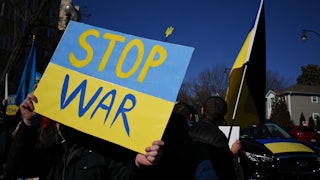“Do you think Americans give a fuck about Ukraine?!”
—Secretary of State Mike Pompeo speaking to NPR broadcaster Mary Louise Kelly in January 2020
Whatever Americans were thinking two years ago, when Pompeo gave his NPR interview, they now do give a fuck about Ukraine—and therein lies a problem: For more than 25 years, the party of Reagan has been transforming itself into the party of Putin, only to discover that Vladimir Putin may not be a great role model after all. As a result, one leading Republican after another has begun to perform Simone Biles–level gymnastics in their bids to condemn their party’s most powerful patron.
Consider that Florida Governor Ron DeSantis now calls Putin “an authoritarian gas station attendant with some legacy nuclear weapons.” Senate Minority Leader Mitch McConnell called Putin “a ruthless thug who’s just invaded another sovereign country and killed thousands of innocent people.” And on Twitter, Senator Lindsey Graham openly called for Putin’s assassination. “The only way this ends is for somebody in Russia to take this guy out,” he tweeted. “You would be doing your country—and the world—a great service.”
But if you think this is hard-line Cold War tough talk from the Reagan-era GOP of yore, think again. It’s not just Donald Trump who’s in Vladimir Putin’s pocket. For more than 25 years, a large swath of the GOP has enjoyed mutually rewarding relationships with Russian operatives funding and working with K Street lobbyists, political consultants, super PACs, campaign fundraising operations, disinformation and propaganda campaigns, social media operations, cyber-warfare efforts, money laundering schemes, think tanks harboring Russian intelligence operatives, and much, much more.
Jonathan Winer, former deputy assistant secretary of state for international law enforcement, has observed the relationship for years. “If you go back to the days of Jack Abramoff, when Americans started going to Moscow in the ’90s, and then to Paul Manafort in Ukraine, and so on, you start to see the spine of a secret influence campaign between the Republicans and Russia that has been built up over decades,” he said. “It goes right up to Tucker Carlson rooting for Putin on Fox today. It has been built up over decades, and it is not new, and it deeply infects the Republican Party. You have two forces with deep political ties that are fighting American democracy in order to keep Putin in power and install a Putin-like system in America. And to that end, they have penetrated deep into our think tanks, our media, our journalism—everything.”
Take Ed Buckham, the recently appointed chief of staff for Representative Marjorie Taylor Greene. Today, Buckham handles a congresswoman who proudly attends “white supremacist, antisemitic, pro-Putin” rallies, as Congresswoman Liz Cheney characterized them, and has become renowned for touting conspiracy theories about how the California wildfires were started by Jewish space lasers. On Thursday, when the House of Representatives voted to suspend normal trade relations with Russia and Belarus, Greene, not surprisingly, was one of eight Republicans who voted against it.
Buckham’s ties to Russian interests date
back 25 years to 1997—before Putin came to power—when he served as an
aide to House Majority Whip Tom DeLay. This was the heyday of “Casino Jack”
Abramoff, the lobbyist-conman who took on pay-for-play clients ranging from the
Choctaw Indian tribe of Mississippi to the Kremlin with a panache made for
Hollywood. At the time, Buckham, in addition to his job with DeLay, oversaw a
lobbying outfit called the U.S. Family Network, which presented itself as a
public advocacy group but was really a vehicle funded largely by clients of Jack Abramoff.
In this case, the relevant clients linked to Abramoff were executives from Naftasib, the Russian energy giant. If DeLay’s lavish six-day excursion to Moscow in 1997 is any indication, the Russians made cultivating DeLay a high priority and spared little expense, as the junket involved golf, lavish dinners, and a meeting with Russian Prime Minister Viktor Chernomyrdin. But the icing on the cake was a $1 million contribution by the Russians to the U.S. Family Network. According to The Washington Post, Buckham told the former president of the U.S. Family Network that Russians made the $1 million contribution specifically to influence DeLay’s vote on legislation to finance a bailout of the collapsing Russian economy.
Ultimately, DeLay was forced out of Congress, indicted, convicted, and sentenced to three years in prison for money laundering and conspiracy charges relating to campaign financing. In 2013, however, his conviction was overturned on appeal. Abramoff served 43 months in jail for mail fraud, conspiracy to bribe public officials, and tax evasion. As for Buckham, he is now back in the fray, a top aide to one of the most controversial and extreme members of Congress. (Buckham did not respond to multiple requests for an interview for this article.)
But Buckham’s and DeLay’s Russian intrigues paled next to those of Paul Manafort, the Roy Cohn–trained fixer and political consultant who represented the interests of corrupt despots the world over—the Philippines’ Ferdinand Marcos, Iraq’s Saddam Hussein, Romania’s Nicolai Ceausescu, Zaire’s Mobutu Sese Seko—and Vladimir Putin. Manafort’s ties with Russia go back to 2004, when he began his journey into the shadowy world of flight capital, offshore companies, and Russian intelligence. In all, over $75 million in Russian funds flowed through Manafort’s operations into his offshore accounts. According to a Senate Intelligence Committee Report, Manafort appointed his constant companion, a Russian intelligence officer named Konstantin Kilimnik, as head of his Ukraine operations with full “power of attorney” to interact with pro-Putin oligarchs who were funding Manafort.
He also set up sophisticated disinformation campaigns, using phony think tanks and phony journalists to write phony stories—all supporting Putin’s phony narratives. As Manafort’s deputy, Rick Gates, once explained, “Paul has a whole separate shadow government structure.… In every ministry, he has a guy.” And much of it was in service to Putin’s objective of taking over Ukraine, not by military force as we are seeing today but from the inside, via the pro-Putin Party of Regions, whose oligarchs paid Manafort, and its candidate Viktor Yanukovych, an oligarch worth $12 billion.
Manafort launched Yanukovych into the Ukrainian presidency in 2010. But by 2013 the pro-European facade he had created for his candidate had been stripped away, revealing Yanukovych to be merely another of Putin’s pawns. After the massive protests in Maidan Square in 2014, when nearly 100 activists were killed, Yanukovych was forced to leave the presidency and flee to Moscow.
Text messages between Manafort’s two daughters, Andrea and Jessica, suggest they felt their father was responsible for the deaths that took place at Maidan. “Don’t fool yourself,” Andrea Manafort texted her sister. “That money we have is blood money.”
So by the time Manafort became Donald Trump’s campaign manager, the die had been cast. Deeply in debt to Putin’s oligarchs, he maintained, according to the report by the U.S. Senate Select Committee on Intelligence in 2020 cited above, ongoing contacts with Kilimnik that “represented a grave counterintelligence threat” because his “presence on the Campaign and proximity to Trump created opportunities for Russian intelligence services to exert influence over, and acquire confidential information on, the Trump campaign.”
According to the Mueller Report, in August 2016, Manafort met with Kilimnik at the Grand Havana Club in New York and, according to an assessment by the Treasury Department, provided “Russian Intelligence Services with sensitive information on polling and strategy,” presumably for use in influence campaigns on behalf of Trump.
Of course, Manafort was not alone among Republican lobbyists in carrying water for Putin. According to Open Secrets, quite apart from Manafort, Russian interests have spent about $182 million on lobbying, influence operations, and propaganda in the last six years.
As I reported in American Kompromat, Jones Day, the fourth-largest law firm in the land, represented at least 10 major corporations and organizations close to Putin. These included: Oleg Deripaska’s Basic Element; the Alfa Group and Access-Renova Group, which jointly own billions in oil and gas assets; Alfa Bank, the largest private commercial bank in Russia; Letterone, a $30 billion holding company for assets in technology, oil, and gas; Rosneft, the world’s largest listed oil company; the Sapir Organization, which helped fund Bayrock’s Trump SoHo; and more.
Likewise, Kirkland and Ellis is the biggest law firm in the world, with a star-studded cast of GOP power brokers in its ranks—among them, former Attorney General William Barr; former solicitor general and GOP attack dog Kenneth Starr; Supreme Court Associate Justice Brett Kavanaugh; Viet Dinh, chief legal and policy officer of Fox Corporation, and as such the secret power behind Fox News; and former national security adviser John Bolton, to name but a few. Its most prized Russian clients have included Alfa Bank, whose key figures, Mikhail Fridman and Petr Aven, were entirely dependent on Putin for their wealth, and Oleg Deripaska’s En+ Group, the largest producer of aluminum in the world outside of China.
Now that Putin has begun waging an old-fashioned war with bombs, bullets, and boots on the ground, and is doing so in an astonishingly brutal and clumsy fashion, it is tempting to forget that in recent years, he has been far, far more successful with the kind of asymmetric hybrid warfare we saw in the 2016 election. So as the horrifying carnage in Ukraine flickers across our television screens, let’s not forget Russian trolls activating strategic influence operations on multiple social media platforms, the money laundering through real estate that enriched Donald Trump and his associates, and the Russian conspiracy theories that just happen to be echoed by QAnon, former Congresswoman Tulsi Gabbard, and the like.
Of course, now that there are far more forceful sanctions in play and Russia has become a pariah state and Operation Kleptocapture is underway, the once-close relationship between figures on the American right and the Kremlin was bound to change. It wasn’t that long ago that Steven Brogan, the powerful managing partner of Jones Day, could interact with partners Don McGahn and Vladimir Lechtman, the head of Jones Day’s Russia practice, and in doing so talk to one man who served as Donald Trump’s attorney and another who was likely the single most trusted corporate counsel to Putin’s oligarchs. Things can’t be quite that cozy these days.
“The sanctions that have been put into place are intended to choke Putin’s entire system of economic as well as military power. In the near term, there is nothing but risk for those who engage with Russia, and intense pressure to withdraw from Russian relationships,” says Jonathan Winer, who is credited with coming up with the Magnitsky Act, applying sanctions to Russian officials who were responsible for the death of Sergei Magnitsky, the tax accountant for Hermitage Capital Management who uncovered massive corruption by Russian officials and was tortured to death. “The international law firms and accounting firms operating in Russia are mostly shutting down for now,” he added.
But that doesn’t mean it’s all over between Russia and the GOP. When Lindsey Graham calls for the head of Vladimir Putin, me thinks he doth protest too much. The relationship will continue. “Russia has been in the influence business a very long time, and it’s a core part of its military doctrine, especially during what others think of as peacetime,” says Winer. “Russian security state influence networks are pervasive and persistent, and they are not going to suddenly disappear just because Putin has now made himself the world’s most hated person. Instead, they are likely to just go deeper underground.
“The oligarchs relied on twin pillars for support, both of which are under attack right now,” Winer adds. “Putin was the wallet, and the West provided entry into the global elite.”
As for the first pillar, the whole world can monitor Putin’s fate day by day, hour by hour, as his army slowly slogs its way across Ukraine getting shelled mercilessly in a showdown that had been billed as an easy win.
And as for the second, the consequences of truly harsh sanctions, of Task Force KleptoCapture, and of other efforts will become evident over time in terms of how much Putin’s oligarchs will be able to enjoy the riches of the West. “That is the great question,” said Winer. “What is our capacity to enforce money laundering? The EU finally made it illegal for corporations to pay bribes. But how will they enforce it?”
And finally, there are other areas, such as cryptocurrency, that are so new that one can’t make any predictions at all. “We know for sure the Russians use crypto for influence operations working out of their St. Petersburg troll farm,” Winer added. “But it is grossly unregulated.” What happens with crypto may be the biggest question of all.








